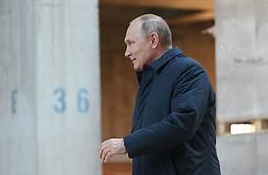He controls the world’s largest nuclear arsenal. The West can’t easily discount his threats
From the very first hours of Vladimir Putin’s war on Ukraine, he has threatened Western countries with terrifying consequences if they dared to intervene. “To anyone who would consider interfering from the outside,” the Russian president warned in a televised address from the Kremlin at the start of the invasion on 24 February 2022, “if you do, you will face consequences greater than any you have faced in history.”
Three days later, as the United States, the United Kingdom, and their allies rushed weapons to Ukraine, Putin summoned senior defence officials and ordered Russia’s nuclear forces to be placed on a “special regime of combat duty.” The escalation of rhetoric and military posture raised fears across the West that Putin was not merely bluffing, but might be willing to take drastic steps in the face of mounting losses and international opposition.
The world’s largest nuclear arsenal is under Putin’s control, and with it comes an ability to impose unparalleled levels of destruction. The threat of nuclear escalation has loomed over the conflict, particularly as Russia’s conventional forces struggle to achieve their objectives in Ukraine. The question arises: is Putin simply using nuclear threats as leverage to prevent further Western intervention, or is there a real risk that he might resort to them?
For the West, the calculus is fraught with uncertainty. While no one can easily predict the actions of a leader whose approach to power has become increasingly unpredictable, the fear of nuclear escalation means that Putin’s words cannot be taken lightly. A misstep could push the situation into catastrophic territory.
Yet, there are signs that the West may be calculating Putin’s threats as bluff. Western leaders have shown restraint in their actions, avoiding direct military confrontation with Russian forces. While sanctions and military aid to Ukraine have continued, NATO countries have steered clear of triggering actions that might lead to a direct clash with Russian forces. This cautious approach suggests that the West believes Putin’s nuclear threats may be designed to secure political gains rather than represent an imminent reality.
However, the risks remain high. As the war drags on and Putin’s strategic objectives become more entrenched, the possibility of escalating the conflict increases. The international community faces a delicate balance in managing the situation, weighing the potential consequences of pushing Putin into a corner against the moral and strategic imperatives of supporting Ukraine’s sovereignty.
The real question is whether Putin is bluffing or whether he is genuinely prepared to take unprecedented steps in his pursuit of victory. For the time being, the West must continue to navigate the murky waters of deterrence, hoping that the prospect of mutual destruction will prevent any further escalation.

